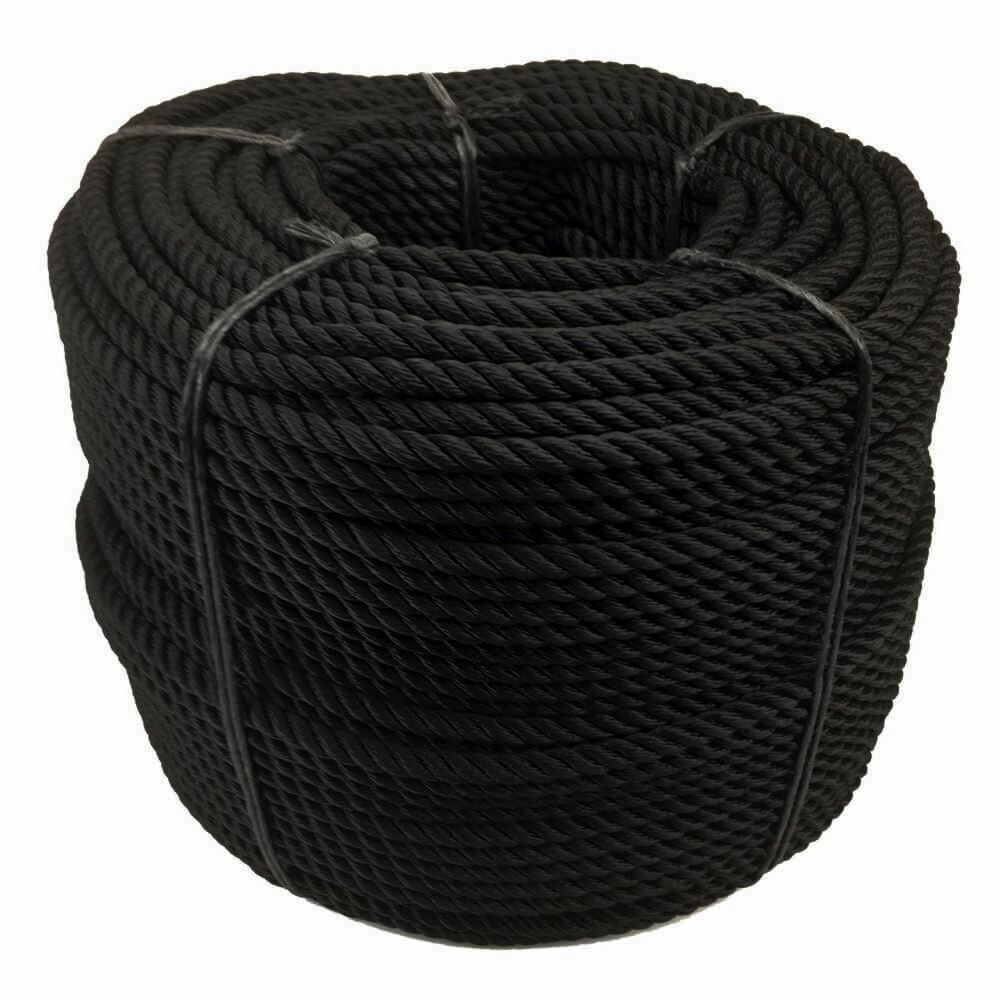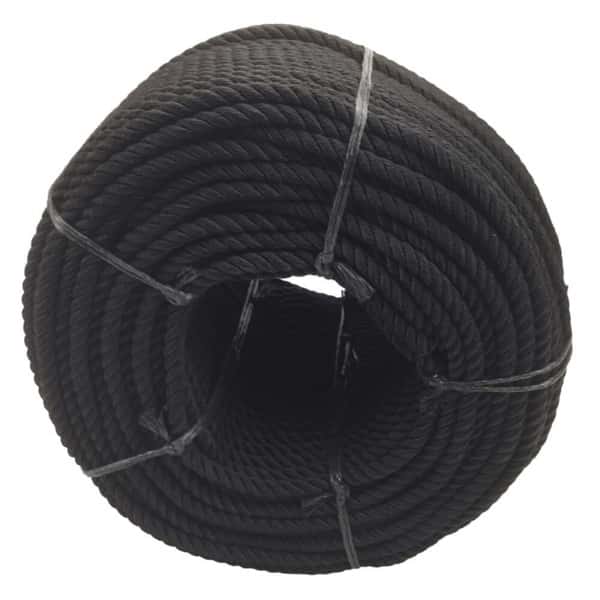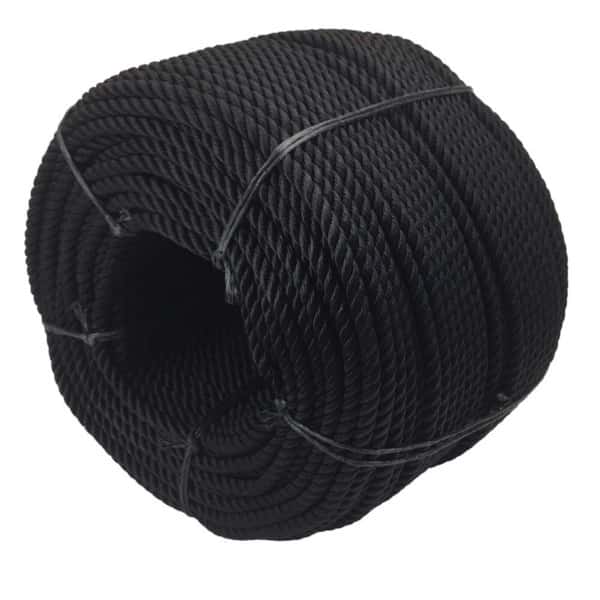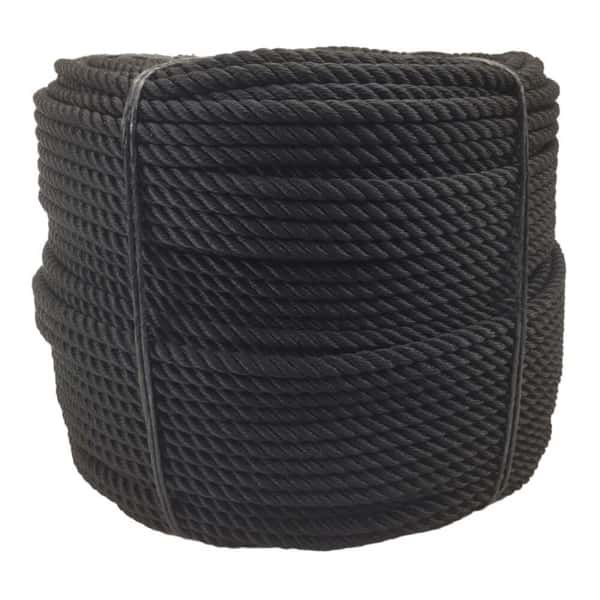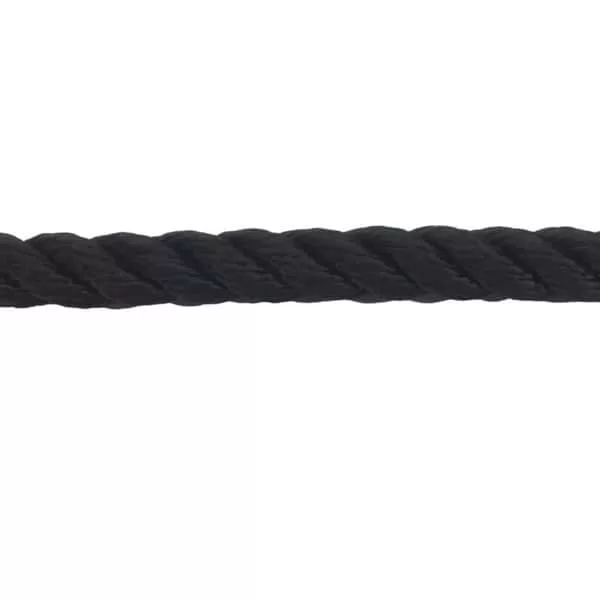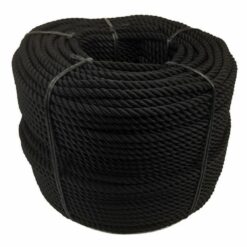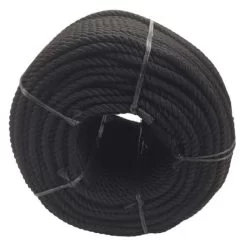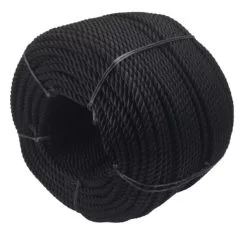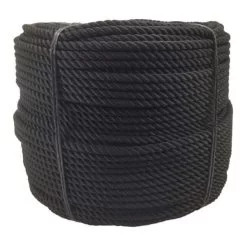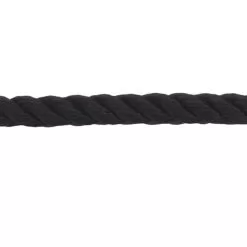18mm Black Nylon 3 Strand Rope x 50 Metres
£145.00
18mm Black 3 Strand Nylon Rope x 50 Metres
Upgrade your mooring and towing experience with our 3-Strand 18mm Black Nylon Rope.
Crafted from high-quality polyamide nylon fibers, this synthetic rope boasts exceptional strength and a soft, tactile feel. Its remarkable shock absorption properties make it the go-to choice for various applications, including towing, mooring, and lifting.
Key Characteristics:
- Non-buoyant (will sink): Ensures stability in water applications.
- High strength and abrasion resistance: Designed to withstand rigorous use and challenging conditions.
- High stretch or elongation: Provides flexibility and adaptability in various tasks.
- Absorbs moisture: Ideal for use in environments where moisture resistance is crucial.
Versatile Uses:
- Mooring ropes, lines, and warps: Secure your vessel with confidence.
- Anchor ropes: Ensure stability and reliability in anchoring.
- Safety ropes for industrial equipment: Trust in the strength and dependability for industrial applications.
- Farming: Tackle agricultural tasks with ease.
- Lifting and winching: Experience reliable performance in lifting operations.
Rope Specifications:
- Material: Polyamide nylon fibres for durability and longevity.
- Construction: 3-strand or 3-ply twisted design for added strength.
- Colour: Elegant black for a sleek and professional appearance.
- Diameter or Thickness: 18mm – the perfect balance of strength and flexibility.
Invest in a rope that combines strength, durability, and versatility. Our 18mm Black 3 Strand Nylon Rope is engineered to meet the demands of towing, mooring, and various other applications. Whether you’re securing your boat, lifting heavy loads, or anchoring with confidence, trust in the reliability of this high-performance synthetic rope.
Make every task a breeze with the superior qualities of our nylon rope. Order yours today and experience the difference in quality and performance.
| Diameter | Max Length Per Reel | Approx Weight Per Coil | Approx Breaking Load |
|---|---|---|---|
| 4mm | 220 Metres | 2.30kg | 321kg |
| 6mm | 220 Metres | 5.00kg | 749kg |
| 8mm | 220 Metres | 8.80kg | 1,346kg |
| 10mm | 220 Metres | 13.60kg | 2,080kg |
| 12mm | 220 Metres | 19.60kg | 2,997kg |
| 14mm | 220 Metres | 26.80kg | 4,099kg |
| 16mm | 220 Metres | 34.80kg | 5,302kg |
| 18mm | 220 Metres | 44.00kg | 6,699kg |
| 20mm | 220 Metres | 53.90kg | 8,300kg |
| 24mm | 220 Metres | 78.10kg | 12,302kg |
| 28mm | 220 Metres | 106.70kg | 15,805kg |
| 32mm | 220 Metres | 138.60kg | 19,986kg |
Please note that all weights and breaking loads provided are approximate. The breaking loads may vary depending on how the rope is finished. It is imperative to subtract 10% from the breaking load for each splice made in the rope. Additionally, please be aware that weights can fluctuate, particularly with natural products, due to differences in manufacturing processes and materials utilised.
Synthetic Rope and Its Properties
Synthetic rope is made from man-made fibers such as nylon, polyester, polypropylene, and polyethylene. These ropes are known for their high strength, durability, and resistance to various environmental factors. Unlike natural ropes, synthetic ropes do not absorb water, making them ideal for use in wet and outdoor environments. However, synthetic ropes have their own set of characteristics and considerations that you should be aware of.
Behavior in Wet Conditions
One of the key advantages of synthetic ropes over natural ones is their minimal water absorption. Synthetic ropes generally do not shrink or expand when exposed to moisture, making them highly reliable in marine, industrial, and outdoor applications. However, while they do not absorb water, some synthetic ropes may become slippery when wet, which can affect handling and knot-holding capabilities.
Effects of UV Exposure
Unlike natural ropes, synthetic ropes are resistant to rot and mildew, but they can be affected by prolonged exposure to UV rays. Over time, UV exposure can weaken the fibers, causing the rope to degrade and lose strength. To mitigate this, synthetic ropes can be treated with UV inhibitors or stored out of direct sunlight when not in use.
Resistance to Chemicals and Abrasion
Synthetic ropes are generally more resistant to chemicals and abrasion compared to natural ropes. For instance, nylon and polyester ropes are highly resistant to various oils, acids, and alkalis, making them suitable for harsh industrial environments. Additionally, these ropes have excellent abrasion resistance, which means they can withstand rough surfaces without significant wear.
Elongation and Stretch
Different types of synthetic ropes have varying degrees of elongation. For example, nylon rope is known for its elasticity, which allows it to absorb shock loads without breaking. This makes nylon rope ideal for dynamic applications such as climbing, towing, and mooring. On the other hand, polyester rope has low stretch, making it suitable for applications where maintaining tension is critical.
Care and Maintenance
To extend the lifespan of synthetic ropes, it’s important to follow proper care and maintenance practices. Regularly inspect the rope for signs of wear, abrasion, or UV damage. If the rope shows significant signs of wear, such as fraying or thinning, it should be replaced to ensure safety and performance.
Storage Considerations
When storing synthetic ropes, keep them in a cool, dry place, away from direct sunlight and chemicals. Coiling the rope properly and avoiding tight bends can also help prevent kinks and maintain the rope’s integrity.
Summary
Synthetic ropes offer numerous advantages over natural ropes, including resistance to water, rot, and chemicals. They are durable and strong, making them suitable for a wide range of applications. However, it’s important to be aware of their susceptibility to UV damage and to take appropriate measures to protect the rope from prolonged exposure. By properly maintaining and storing synthetic ropes, you can ensure their longevity and reliable performance in various conditions.



